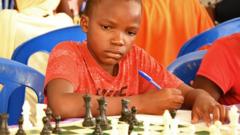In the heart of Kampala's Katwe slum, Robert Katende's chess academy remains a beacon of hope and opportunity for local children. For over 20 years, Katende has utilized chess as a powerful educational tool, guiding young minds towards brighter futures. His dedication not only helped elevate the profile of the sport in Uganda but also inspired a generation, with the remarkable journey of former chess prodigy Phiona Mutesi serving as the focus of the Disney film "Queen of Katwe."
Katende's journey began after he graduated as a civil engineer. Initially volunteering as a football coach, he shifted his focus to chess in 2004, armed with only one chessboard and a vision for change. Among his earliest students was Phiona Mutesi, who, despite dropping out of school, rose to become a national champion and an international chess competitor. Her story resonated globally, ultimately leading Disney to adapt it into a film, earning critical acclaim and drawing attention to Katende's initiatives.
Over the years, Katende has trained more than 4,000 children, with many surpassing their circumstances to pursue careers as doctors, engineers, and lawyers. His efforts earned recognition and funding that expanded his chess programs beyond Uganda's borders, offering life lessons and hope to disadvantaged youth in neighboring countries.
However, financial hardships threaten the stability of his programs, exacerbated by the pandemic that caused many partners to withdraw. While Katende dreams of expanding his reach further, the realities of limited resources remain daunting. His chess academy serves over 2,500 children, and competitions often leave numerous talented players desperate for the necessary support to compete internationally.
Despite the setbacks, Katende remains resilient, finding solace in the power of chess as a metaphor for life's challenges. While Disney's film was intended to showcase his work and reward him financially, the reality has been mixed; he is still awaiting the promised support that could transform his academy's future.
While Mutesi has successfully carved out a new path for herself, studying in the United States and now working in Canada, challenges persist for current aspiring chess champions. Katende's optimism remains, believing that as awareness grows, so too will support for his mission.
Although setbacks are a part of this ongoing journey, Katende and his students continue to fight for a checkmate in their lives through the strategic game of chess — a game that teaches resilience, strategy, and the power to overcome life's obstacles.
Katende's journey began after he graduated as a civil engineer. Initially volunteering as a football coach, he shifted his focus to chess in 2004, armed with only one chessboard and a vision for change. Among his earliest students was Phiona Mutesi, who, despite dropping out of school, rose to become a national champion and an international chess competitor. Her story resonated globally, ultimately leading Disney to adapt it into a film, earning critical acclaim and drawing attention to Katende's initiatives.
Over the years, Katende has trained more than 4,000 children, with many surpassing their circumstances to pursue careers as doctors, engineers, and lawyers. His efforts earned recognition and funding that expanded his chess programs beyond Uganda's borders, offering life lessons and hope to disadvantaged youth in neighboring countries.
However, financial hardships threaten the stability of his programs, exacerbated by the pandemic that caused many partners to withdraw. While Katende dreams of expanding his reach further, the realities of limited resources remain daunting. His chess academy serves over 2,500 children, and competitions often leave numerous talented players desperate for the necessary support to compete internationally.
Despite the setbacks, Katende remains resilient, finding solace in the power of chess as a metaphor for life's challenges. While Disney's film was intended to showcase his work and reward him financially, the reality has been mixed; he is still awaiting the promised support that could transform his academy's future.
While Mutesi has successfully carved out a new path for herself, studying in the United States and now working in Canada, challenges persist for current aspiring chess champions. Katende's optimism remains, believing that as awareness grows, so too will support for his mission.
Although setbacks are a part of this ongoing journey, Katende and his students continue to fight for a checkmate in their lives through the strategic game of chess — a game that teaches resilience, strategy, and the power to overcome life's obstacles.

















